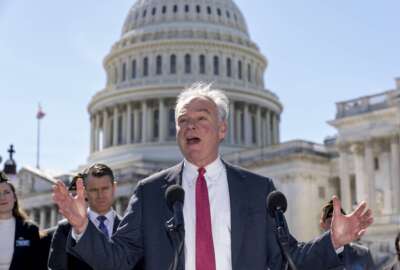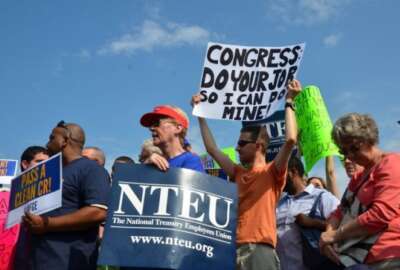Schedule F is dormant, but still haunts the civil service
Schedule F, the Trump-era civil service innovation, not the tax form, is like a zombie.
Schedule F, the Trump-era civil service innovation, not the tax form, is like a zombie. It is dead, having been canceled by the Biden administration, but it still seems animated, judging from the range of activities devoted to keeping it entombed. For more, the Federal Drive with Tom Temin spoke with the Policy Counsel at POGO, the Project on Government Oversight, Joe Spielberger.
Interview Transcript:
Joe Spielberger Schedule F refers to an executive order that former President Trump signed near the very end of his presidency. It would have created a new category of federal worker that basically would have existed outside of the regular laws and regulations governing the rights and protections that most federal employees have. And basically, it would have been it would have just made it easier for a president or a political appointee to fire employees for, for almost any reason.
Tom Temin But it was for the excepted service, not the regular civil service. Correct?
Joe Spielberger Right, exactly. It would have created this new category in the excepted service. And so, it would have allowed agencies to unilaterally transfer employees from the competitive service to this new category, or from other excepted service categories into the into schedule F as well.
Tom Temin Right. So, for example, a senior executive program manager, a career person could potentially under schedule F be moved into schedule F. And the presumption is that the administration at the moment didn’t like the way that program was being run or felt that its policy was being thwarted by that person.
Joe Spielberger Exactly. And while the executive order only started to become implemented, it was estimated that the number of employees who would have been impacted under schedule F would have totaled in the tens of thousands, up to 50,000, even 100,000 or more. And so, just to put that number in a little bit of context, normally there are roughly 4000 political appointees. So just by those estimates alone, it would have exponentially increased the number of political appointees by ten, 20 or even more.
Tom Temin And it would have had the potential, again, to emphasize that point of arbitrarily converting some people that were already in competitive service to noncompetitive or the schedule F type of thing. So that means, given that potential number of 100,000, that goes way beyond the senior executive service, which is only about 9000.
Joe Spielberger Exactly. And then, you know, if you talk to some of the pro schedule F proponents, you know, they will argue that it wouldn’t be necessary to transfer that number of employees. But what’s important is that they are very clear, about using this as, chilling example, you know, firing a few employees, at first to set an example and then just establishing this really culture of fear and intimidation in agencies across the federal government.
Tom Temin And now the status of schedule F is that I think that was one of the first things that the Biden administration did away with. Correct?
Joe Spielberger That’s right. Yes. President Biden rescinded the executive order upon taking office. Of course, now, as we’ve seen, through, the current presidential race, you know, schedule F has really gotten the consensus of much of the Republican Party. And so, Ross, but, for instance, the former OPM head, who’s now playing a key role in the Heritage Foundation and their project 2025, has said that it’s unlikely that any future Republican president would fail to implement schedule F. And so regardless of what happens in this upcoming election, this is an issue that certainly is not going away anytime soon.
Tom Temin In the meantime, though, besides the repealing that happened early by the Biden team, there’s also an OPM rule, correct, that bans it, so to speak.
Joe Spielberger Yeah. So OPM recently finalized a new rule to strengthen protections for civil servants. It does a few really important things. First, it clarifies that employees would retain the same adverse action protections when they are transferred into this type of category. It also clarifies the loophole that President Trump exploited by, further defining that when we talk about this confidential policy determining, policy making or policy advocating employees, that really refers to employees who are non-career political appointees. And then the third main thing that it does is it also outlines a new process that agencies would have to follow to transfer and initiate new hiring actions. And so, this is a really important roadblock. It’s not the end all be all. You know, we still need legislation to fully prevent a more politicized civil service. But this is an important, next step in strengthening these protections for civil servants.
Tom Temin We’re speaking with Josh Spielberger, our policy counsel at the Project on Government Oversight. Yes, there’s a rule from OPM. But of course, let’s face it, OPM has directors that are appointed by administration. So OPM itself moves back and forth policy wise with respect to who’s in power. So, the rule then is a little bit stronger maybe than the executive order. But rules can be rerolled also. What is the prospect for legislation here? There is something that comes up from time to time in Congress.
Joe Spielberger There is there’s been legislation the past couple of years, in the House, sponsored by Representative Gerry Connolly. And then, there’s a Senate companion bill sponsored by Senator Tim Kaine. POGO and other good governance advocates have, lobbied strongly for that. We understand the political dynamics make it really unlikely to see that bill moving this Congress. So, we’re continuing to have conversations both on the Hill, and in executive branch agencies to see what other defensive mechanisms we can enact this Congress.
Tom Temin What has POGO been doing on this and what type of work have you done?
Joe Spielberger So POGO is, again, continuing all of these conversations with lawmakers, with advocates. And the main thing that we’re trying to do right now is really make it clear that when we talk about schedule F and threats to civil servants, we are not just talking about the impact on federal employees themselves, but we’re really talking about the harms to communities and, rights and benefits and services that we all rely on and many of us take for granted that would be under threat, under a more politicized civil service. And so especially, looking towards this upcoming presidential election, we want to make sure that voters across the country and advocates and lawmakers are really keeping this issue front and center in their mind so that they’re aware of the threats that await us.
Tom Temin Well, what threats, what policy or benefit to the community, to a community could be threatened by this?
Joe Spielberger So there are so many different, of course, critical roles that impact us in our day to day lives. I think a really good example is disaster relief. If your home is threatened by a hurricane or a natural disaster, your community is at risk. You want to make sure that federal relief arrives safely and timely and effectively, regardless of where you live. How your state voted in the previous presidential election. You know, we always see accusations of political gamesmanship, when it comes to providing disaster relief, things like Social Security benefits. If you apply for Social Security and other government benefits, you need to be able to trust that the people processing and delivering those benefits, you know, are in those positions, because of their qualifications and not because of their political ideology. And so, at the end of the day, everyone deserves a federal government that, treats them fairly and effectively, regardless of who they are, where they live, or how they vote.
Tom Temin And is the potential, though, for the schedule F to run in two directions. That is to say, if a Democratic administration had it, the same ill effects could happen as if a new Trump administration or something had schedule F.
Joe Spielberger Absolutely. This is a really bad policy, regardless of whether there’s a Republican in the White House or a Democrat in the White House. And again, there’s a reason why we rely on these nonpartisan civil servants to provide these protections and services that we all rely on, and make sure that those services and benefits are being provided fairly and effectively.
Copyright © 2025 Federal News Network. All rights reserved. This website is not intended for users located within the European Economic Area.
Tom Temin is host of the Federal Drive and has been providing insight on federal technology and management issues for more than 30 years.
Follow @tteminWFED






